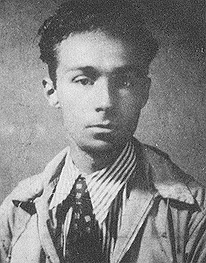
Primo Levi was born in Turin, Italy, in 1919. He came from a Jewish, middle-class family, well established in Piedmont - his grandmother had been a baroness. Shy in his youth and teased at school for being small, he was an intensely thoughtful boy although his reflective nature was alleviated by his hobbies; cycling and mountain climbing.
Under Mussolini's rule, it was Levi's Jewishness rather than his size that made him stand out. When he began studying chemistry at the University of Turin it was only a year before the racial law of 1938 forbade Jews access to universities. By the time he graduated, first in his class, in 1941 life for Jews in Italy was becoming impossible. Levi reacted to the repression he was experiencing, writing secretly for the resistance magazine Giustizia e Liberta and making contact with a group of partisans in the mountains after the fall of Mussolini.

In December 1943 Levi was captured. Two months later he found himself on a train bound for Auschwitz as part of a cargo of six hundred and fifty men, women and children. Of these, only fifteen men and nine women survived the war. Levi escaped death thanks in good part to his training as a chemist. 'Since specialized labour was very scarce they searched among us...this was for me a piece of fortune because I said I was a chemist not knowing that we were assigned to a chemical products factory.' Foreign workers in the factory occasionally sneaked him bread or soup. Levi escaped the final long march that killed most of the last inhabitants of Auschwitz being abandoned to typhoid when the camp was liberated by the Russians.
The rest of Levi's life was dominated by the struggle to deal with his memories of Auschwitz. Returning to Turin after an epic journey that took him through Poland, Belorussia, the USSR, Hungary and Romania (the subject of 'The Truce'), he suffered recurring nightmares and a powerful sense of guilt. Levi took employment as a chemist in a paint factory where he rose to become general manager in1961 and wrote as a way of exorcising his demons. In 1953 'If this is a Man' was published and won international acclaim. Written partly as a catharsis and partly in order to record for history the events that took place at Auschwitz it has sold over half a million copies in Italy and been translated into eight languages.
There followed, among others, 'The Truce', 'The Monkey's Wrench' and 'The Periodic Table', earning Levi high praise from high places. Married by now, he gave up his chemist's job in 1977 in order to concentrate full time on writing.

Levi did not, in the end, conquer his demons. He suffered severe depression, revealing in his lectures in 1979 a profoundly pessimistic view of the world, and regarding life as terrible. He committed suicide in Turin in April 1987. His books are a testament to his struggle, written in a scientific and concise style that approaches poetry in its selection of words. Levi's objectivity when describing his ordeal at the hands of the Nazis is especially remarkable.